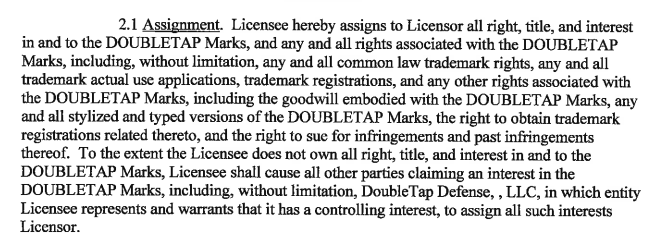We have a story of three firearm and ammunition companies. The parties in the case are DoubleTap Defense, LLC (DTD), a company that had an application to register the trademark DOUBLETAP for pistols, and Hornady Manufacturing Co., owner of several TAP-formative registrations for ammunition. The third company, not a party, is Double Tap Ammunition (DTA), an ammunition manufacturer that uses the unregistered trademark DOUBLETAP. DTD and DTA are not related to each other.
In 2011, Hornady sued DTA for trademark infringement. Also in 2011 Horandy opposed the DTD application and in 2012 Hornady sued DTD. DTD ended the suit by assigning the DOUBLETAP trademark to Hornady and in return Hornady licensed the DOUBLETAP mark back to DTD. DTD then expressly abandoned its DOUBLETAP trademark application.
In 2013 Hornady lost its lawsuit against DTA, with the court holding that there was no likelihood of confusion between TAP and DOUBLETAP. The decision was affirmed by the Court of Appeals for the 10th Circuit.
On June 9, 2014, DTA sent DTD a cease and desist letter alleging DTD’s use of the DOUBLETAP mark infringed DTA’s unregistered trademark in DOUBLETAP. DTD ceased its sale of the DOUBLETAP pistol and sent the letter to Hornady, demanding that Hornaby honor its duty in the license agreement to indemnify DTD for “liability related to trademark infringement claims for its use of the marks as contemplated by this agreement.” Hornady refused so DTD sued.
Hornby claimed that it was excused from its requirement to indemnify because DTD had breached this provision of the agreement:
If you can’t see the image, it says:
2.1 Assignment. Licensee [DTD] hereby assigns to Licensor [Hornady] all right, title, and interest in and to the DOUBLETAP Marks, and any and all rights associated with the DOUBLETAP Marks, including, without limitation, any and all common law trademark rights, any and all trademark actual use applications, trademark registrations, and any other rights associated with the DOUBLETAP Marks, including the goodwill embodied with the DOUBLETAP Marks, any and all stylized and typed versions of the DOUBLETAP Marks, the right to obtain trademark registrations related thereto, and the right to sue for infringements and past infringements thereof. To the extent the Licensee [DTD] does not own all right, title, and interest in and to the DOUBLETAP Marks, Licensee [DTD] shall cause all other parties claiming an interest in the DOUBLETAP Marks, including, without limitation, DoubleTap Defense, [sic] LLC, in which entity Licensee represents and warrants that it has a controlling interest, to assign all such interests [to] Licensor.
(Emphasis added.) Hornady claimed that the words “Licensee shall cause all other parties claiming an interest in the DOUBLETAP Marks … to assign all such interests to Licensor” meant that DTD was supposed to somehow cause the assignment of DTA’s trademark rights.
I’ll interject that, if I had reviewed the agreement, it never would have occurred to me that it could be read to suggest that the assignment provision applied to the marks of unrelated parties. Sure, it doesn’t say it doesn’t, but who would’ve thought?
Luckily, the court didn’t read the agreement the way that Hornady hoped. The court held that DTA’s assignment just wasn’t something DTD could do:
Upon execution of the Licensing Agreement, DTD became a mere non-exclusive licensee with respect to the DOUBLETAP marks and could not have taken legal action to cause DTA to involuntarily relinquish its rights in the DOUBLETAP Marks to Hornady. The Licensing Agreement clearly contemplated that Hornady, not DTD, would be the party enforcing ownership, even as to past infringements.
Section 6.1 also supports the conclusion that section 2.1 was not intended to include DTA. Section 6.1, titled “Licensor’s Ownership Rights,” states:
6.1 Licensee [DTD] acknowledges Licensor’s [Hornady’s] exclusive right, title, and interest in and to the Marks in the firearms and ammunition industry, including, without limitation, the DOUBLETAP Marks, and the right to license the rights set forth in this Agreement; provided, however, that the Parties acknowledge the existence of third-party trademarks that potentially infringe on the Marks, and that Licensor [Hornady] is currently engaged in litigation to resolve such use and ownership issues.
It is not reasonable to interpret the Licensing Agreement as unambiguously requiring DTD to cause DTA to assign its rights in the DOUBLETAP Marks to Hornady when the Licensing Agreement acknowledges that Hornady was “currently engaged in litigation to resolve such use and ownership issues” related to the potential infringement on the Marks.
The language of section 7 of the License Agreement further demonstrates that section 2.1 does not unambiguously encompass “all other parties” including DTA. Section 7 states, in part, as follows:
SECTION 7. INDEMNIFICATION. EACH PARTY SHALL INDEMNIFY, DEFEND, PROTECT, AND HOLD HARMLESS THE OTHER PARTY … FROM AND AGAINST ALL CLAIMS, DEMANDS, LAWSUITS, DAMAGES, LIABILITIES, JUDGMENTS, COSTS, AND EXPENSES (INCLUDING REASONABLE ATTORNEYS’ FEES) ARISING FROM OR RELATING TO A PARTY’S BREACH OF THIS AGREEMENT; … OR, WITH RESPECT TO LICENSEE [DTD[, LIABILITY RELATED TO TRADEMARK INFRINGEMENT CLAIMS FOR ITS USE OF THE MARKS AS CONTEMPLATED BY THIS AGREEMENT.
If section 2.1 required DTD to cause all other parties to assign their rights to Hornady there would be no reason for Hornady to agree to indemnify DTD for “LIABILITY RELATED TO TRADEMARK INFRINGEMENT CLAIMS” because there could be no such liability.
I think this was a Hail Mary by Hornady, but I will have this case in mind when negotiating future agreements.
DoubleTap Defense, LLC v. Hornady Mfg. Co., No. 8:18CV492 (D. Neb. Feb. 11, 2019).

This work is licensed under a Creative Commons Attribution-NoDerivatives 4.0 International License.


Leave a Reply